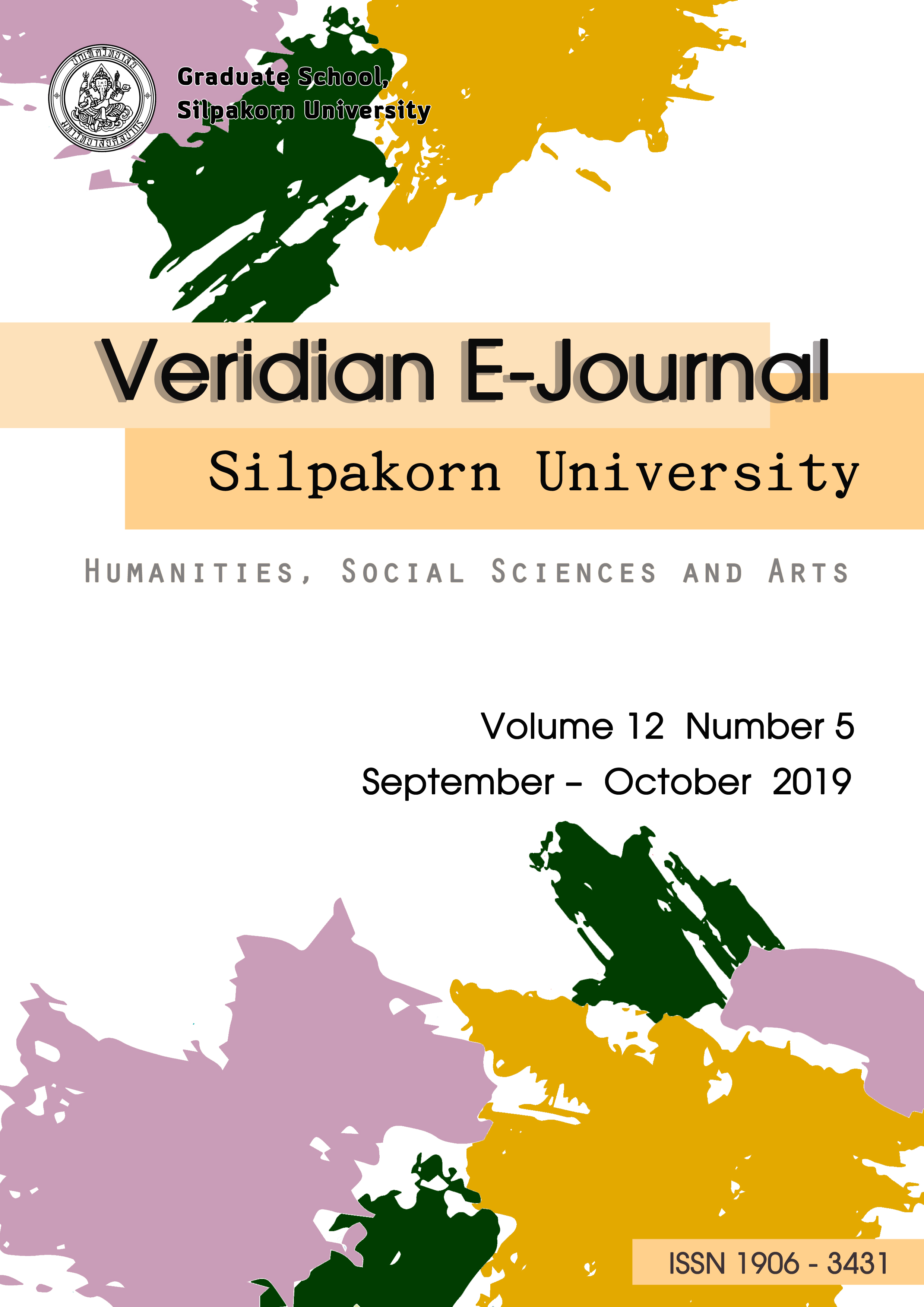ปัญหาและการปรับตัวของแพทย์แผนไทยหลังจากการฟื้นฟูการแพทย์แผนไทย กรณีศึกษา ชมรมแพทย์แผนไทยแห่งหนึ่ง (Problem And Adaptation Of Thai Traditional Medicine Healers After Regulation Case Study Of A Thai Traditional Medicine Club)
Main Article Content
บทคัดย่อ
การศึกษาครั้งนี้มีวัตถุประสงค์เพื่อ 1) ศึกษาถึงจุดเริ่มต้นของการเป็นแพทย์แผนไทย ความรู้ ความมั่นใจที่มีต่อยาไทย ตลอดจนความคิดเห็นในด้านต่างๆ เกี่ยวกับการแพทย์แผนไทย ของสมาชิกชมรมแพทย์แผนไทยแห่งหนึ่ง 2) เพื่อศึกษาผลกระทบจากนโยบายของรัฐบาลในการฟื้นฟูการแพทย์แผนไทยที่มีต่อแพทย์แผนไทย 3) เพื่อศึกษาการปรับตัวของแพทย์แผนไทยภายใต้บริบทของการฟื้นฟูการแพทย์แผนไทย โดยใช้ระเบียบวิธีวิจัยเชิงคุณภาพ เก็บรวบรวมข้อมูลด้วยการสัมภาษณ์เชิงลึก และวิธีการสังเกตแบบไม่มีส่วนร่วมใช้วิธีการเลือก กลุ่มตัวอย่างแบบเฉพาะเจาะจง โดยมีผู้ให้ข้อมูลสำคัญคือ แพทย์แผนไทยจำนวน 10 คน นำข้อมูลมาสรุปผลในเชิงวิเคราะห์และพรรณนา อธิบายด้วยมุมมองทางมานุษยวิทยาการแพทย์ โดยมีแนวคิดมานุษยวิทยาการแพทย์เชิงวิพากษ์เป็นหลัก ร่วมกับแนวคิดเกี่ยวกับบทบาทของผู้รักษา (healers)
ผลการศึกษาพบว่า 1) ข้อมูลเกี่ยวกับแพทย์แผนไทยในชมรมที่ศึกษามีดังนี้ 1.1) จุดเริ่มต้นของการเป็นแพทย์แผนไทยมีความคล้ายคลึงกัน คือสืบทอดกิจการต่อจากบรรพบุรุษ แต่ก็มีบางคนที่เรียนรู้ด้วยตนเองและแพทย์แผนไทยในชมรมนี้ผ่านการสอบใบประกอบโรคศิลป์ทางการแพทย์แผนไทย 1.2) ความรู้เรื่องยาไทย มักได้จากบรรพบุรุษ และจากการเสาะแสวงหาอาจารย์ที่มีความรู้และตำรายาดี ๆ เรื่องความมั่นใจที่มีต่อยาไทยนั้น ส่วนใหญ่จะมีค่อนข้างสูง มีบางส่วนที่มั่นใจในยาไทยมาก แต่ก็มีบ้างที่ไม่สามารถตอบได้ 1.3) ความหลากหลายในอาชีพแพทย์แผนไทย มีรายละเอียดถึง 6 รูปแบบ เช่น การขายยาแผนโบราณ และการรักษา พร้อมทั้งเจียดยา หรือรับเจียดยาอย่างเดียว หรือขายเฉพาะยาแผนโบราณสำเร็จรูป เป็นต้น 1.4) อนาคตของแพทย์แผนไทยมีความเห็นแบ่งเป็น 3 กลุ่ม คือ ยาไทยยังคงมีอยู่ในสังคมไทย ไม่หายไปเพราะเป็นของดี ของมีค่าและมีคนสืบทอด อีกกลุ่มหนึ่งเห็นว่ายาไทยคงไม่หายไป แต่จะไปอยู่ในคนอีกกลุ่มหนึ่ง ชาวบ้านจะเข้าถึงได้น้อยลง ส่วนกลุ่มสุดท้ายซึ่งมีจำนวนน้อย เห็นว่าทั้งยาไทยและยาจีนอยู่ไม่ได้ หายไปแน่นอน และคิดว่ายาจีนน่าจะหมดไปก่อนยาไทย เพราะคนที่อ่านตำราจีนได้มีน้อยลงเรื่อย ๆ
2) ผลกระทบจากนโยบายของรัฐในการฟื้นฟูการแพทย์แผนไทยที่มีต่อแพทย์แผนไทย มี 2 ลักษณะคือ 2.1) ปัญหาที่เกิดจากข้อกำหนดของรัฐ มี 8 ข้อ เช่น ปัญหาเรื่องการสอบใบประกอบโรคศิลป์ การกำหนดหลักเกณฑ์ที่ดีในการผลิตยาจากสมุนไพร หรือที่เรียกว่าปัญหา GMP อันเป็นปัญหาที่เกิดจากผลกระทบโดยตรง และในการศึกษาพบว่ามีปัญหาอีกจำนวนหนึ่งที่มีอยู่ก่อนแล้วในการแพทย์แผนไทย คือ 2.2) ปัญหาที่มีอยู่เดิมในการแพทย์แผนไทย มี 7 ข้อ เช่น การขาดความเชื่อมั่นในประสิทธิภาพการรักษาแบบแผนไทย ปัญหาเรื่องการจัดการด้านตำรายาและยาแผนไทย ปัญหาที่เกิดจากตัวแพทย์แผนไทยเอง เป็นต้น 3) การปรับตัวของแพทย์ แผนไทยภายใต้บริบทของการฟื้นฟูการแพทย์แผนไทยนั้น พบว่ามีการปรับตัว 2 ลักษณะคือ 3.1) การปรับบทบาทการรักษา (Adaptive Curing Role) คือยังคงบทบาทหลักไว้ คือบทบาทในการรักษา แต่ก็จะปรับตัวในเรื่องที่จะมีผลต่อสถานภาพแพทย์แผนไทยโดยตรง ซึ่งมักเป็นแง่มุมในเรื่องกฎหมาย เช่น การสอบใบประกอบโรคศิลป์ และการปรับมาตรฐานการผลิตยา GMP เพื่อให้ผ่านเกณฑ์ของรัฐ 3.2) การลดบทบาททางด้านการรักษา (Attenuated Curing Role) การปรับตัวลักษณะนี้มีน้อยกว่าการปรับตัวแบบแรก เป็นการปรับตัวที่แพทย์แผนไทยไม่อยากให้เกิดสถานการณ์นี้ขึ้น แต่ก็เกิดขึ้นแล้ว แพทย์แผนไทยบางส่วนจึงคิดว่าในอนาคตคงต้องเลิกขายยาแผนไทย เพราะตอนนี้ยอดขายก็ลดลงเป็นลำดับ
นอกจากนี้ยังพบว่าในพื้นที่ศึกษานั้นแพทย์แผนไทยมีคุณสมบัติและมีบทบาทของผู้รักษาสอดคล้อง กับแนวคิดเรื่องบทบาทของผู้รักษา (healers) อีกประการหนึ่งด้วย
This study has three objectives: 1) to understand Thai traditional medicine club members’ motivation for becoming a Thai traditional medicine healer, including their confidence in traditional Thai medical knowledge and opinions about various aspects of its practice; 2) to understand how changes in government regulation policies has impacted the effectiveness of Thai traditional medicine; and 3) to study how Thai traditional medicine practitioners have adapted under government regulation policies. This paper presents a qualitative methodology, conducted by in-depth interview and non-participant observation using a purposive sampling strategy. Ten traditional medicine healers are the key informants in this study. The data are used to summarize, analyze, and describe Thai traditional medical concept and medical healers’ roles through the lenses of critical medical anthropology.
The results of the study found that
1) Information about Thai traditional medicine in the clubs studied is as follows: 1.1) Thai traditional medicine club members’ motivation for becoming a Thai traditional medicine healer are similar. Some of them passed on the business from generation to generation, but there are some people who learn how to run the business by themselves. Thai traditional medicine healers in this club has passed the examination of the Thai traditional medical license. 1.2) Thai medical healers have confidence in this practice and fully trust in Thai medicine because Thai medical knowledge was passed on from generation to generation or was found through good medical teachers with reputable medical texts. Even so, there are some people who could not answer this question. 1.3) The Thai traditional medicine profession is divided into 6 categories, which include but are not limited to selling traditional medicine, preparing medical treatments, making traditional medicine, selling medicine that was prepared by others, and so forth. 1.4) Thoughts about the future of Thai traditional medicine can be characterized by 3 groups of opinions. The first group believes that Thai medicine will persist in Thai society because of its value. The second group believes that Thai medicine will be passed on into a more limited group of people and there will be fewer opportunities for villagers and common people to access this knowledge. The third and final group, represented by only a small number, believes that both Thai and Chinese medicines will disappear completely, starting with Chinese medicine since fewer and fewer people are able to read Chinese texts.
2) The changes in government regulation policies have impacted the effectiveness of Thai traditional medicine into two ways. 2.1) Eight problems have arisen from government regulation policies, including the problems associated with the required examination to get Thai medical healer’s license, issues about the criteria for high quality Thai herbal medicine production (referred to as the “GMP problem”), etc. This study finds that seven problems that already existed in Thai traditional medicine which are 2.2) Seven problems have arisen previously, including the lack of confidence in the efficiency of Thai traditional treatments, problems concerning textbooks and traditional Thai medicine management, and problems caused by the healers themselves, among others. 3) How Thai traditional medicine practitioners have adapted under government regulation policies can be defined into 2 aspects. 3.1) Adaptive Curing Role, where Thai traditional medicine’s main role is of treatment. This is directly affected by the law, including requirements such as getting a Thai traditional medicine license and adjusting the medicine production using GMP production standards to meet government criteria. 3.2) Attenuated Curing Role, a type of adaptation found less commonly than the first type. It is a change in which some Thai traditional medical healers than they must stop selling traditional Thai medicine in the near future because sales are already decreasing gradually and are expected to stop eventually.
In addition, it has been found that in the study area, key Thai traditional medicine healer informants have the qualifications as the healers related to traditional views of the medical healers’ role.

